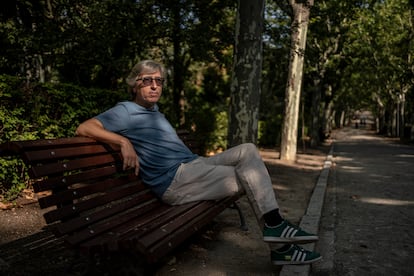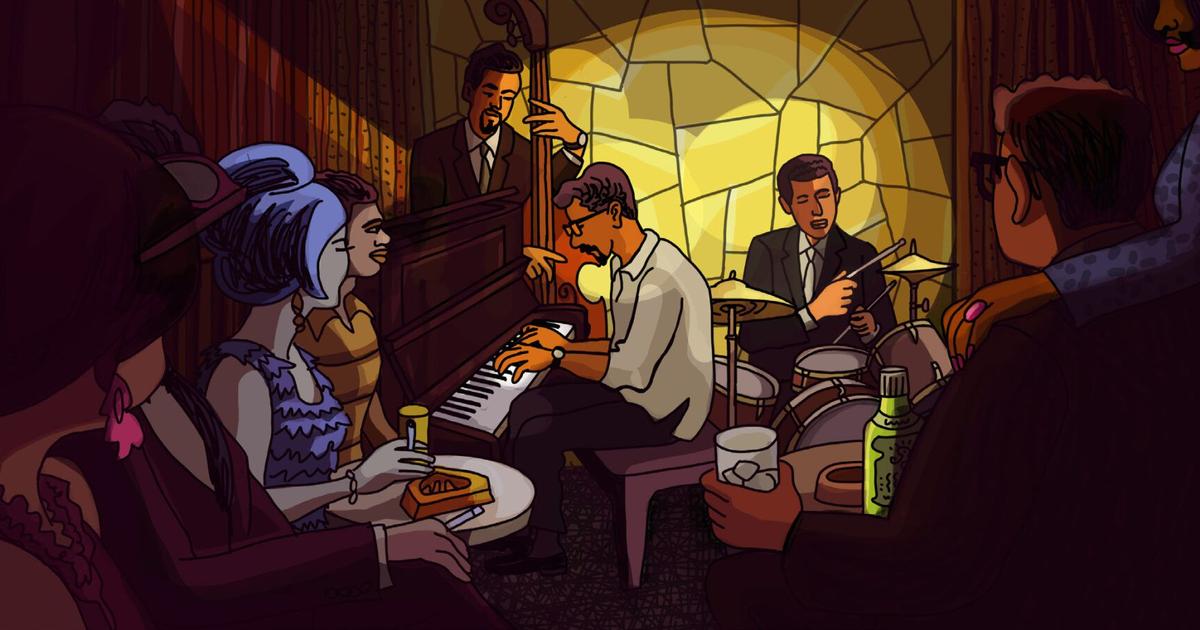David Trueba, last Wednesday in Madrid.Olmo Calvo
Dear children
(Anagrama), the last novel by David Trueba (Madrid, 51 years old), is the chronicle of an electoral campaign, but as Spanish political life is, it could also be the narration of what happens daily in the different scenarios (the media, the networks, the Parliament) in which the fight takes place in which one and the other claim to be the ones who should be elected to govern a country that knows no truce in this incommunicado palace that is the national stage.
The writer and filmmaker talks about his book sitting in the peaceful Quinta de los Molinos, very close to the EL PAÍS newsroom, where he collaborates.
More information
David Trueba: "Melilla is the brutal expression of the border"
The weak point of democracy
Question.
It seems that you have been embedded in the campaign you describe and that this is not fiction but reality ...
Answer.
The campaign has become a magmatic experience in democracies. It invades the entire political and media structure of society for an infinite time, where all behaviors are campaign, with all the good and bad that it has. The campaign is a desperate search for a flattering photo, and therefore the mechanism is dialectical: transforming whatever happens into one's own advantage and into a disadvantage for rivals. It is the ecosystem in which we live. In a world turned into a hostile, complicated territory, it is necessary to look for how the human being can survive in a kind of mousetrap. That is the purpose of the novel, and also of my novel.
In a world turned into a hostile, complicated territory, we must find out how human beings can survive in a kind of mousetrap.
Q.
This in particular is a melancholic portrait of a country that since Adolfo Suárez has lived with the illusion of democratic awakening, which is finally resolved in the common places and in the disqualifications in which you encrypt the political dialogue.
R.
I think that all people use the same arguments, even if it is believed that this is exclusive to politicians.
When they talk to me about populism in politics, I think there is also populism in artists, in journalism.
It's that desire to say what people want to hear, even if it's not what you think or what needs to be said.
That populism has invaded all spheres.
The other thing is window dressing: the person appearing all the time in a flattering window, including victimhood.
Everything bad that has happened to me, they seem to say, is someone's fault.
There is no longer personal responsibility.
That creates a huge void, an absolute void, in a world in which everything is exhibition, narcissism, and what is underneath is empty, empty, empty.
P.
In the book he deals with how journalism experiences this degradation, which is also related to coexistence.
R.
Journalism aims to follow.
He wants to be liked and then he betrays his spirit.
The newspaper does not come out in the morning to please, but to pester, to analyze, to be critical, to try to make people strive to go a little beyond the photo, beyond the news that is already made and chewed .
We have seen so many times that lynchings have been carried out by the press, being carried away by something that someone has interpreted without reliable arguments.
The press is not there for that.
The press should be a place of discomfort, but also of contention about the things you believe in.
We try to please too much and that makes us master dogs who are also very changeable.
Journalism points to follow-up.
He wants to be liked and then he betrays his spirit.
The newspaper does not come out in the morning to please, but to pester
Q.
And can politics be done in another way?
R.
A democratic leader plays at a disadvantage against a leader who poisons his political rival, who bans the media, who has suppressed demonstrations and who does not have a free press. There are millions of people who are giving up their lives to reach democratic countries, while the citizens of democracies do not strengthen themselves in the pride of saying “we have a system that allows us to say what I think, disagree with power, substitute the powerful or to the leader ”. Perhaps the greatest enemy of the democratic system is the lack of value given to democracy by the citizens of democracies themselves, who think that everyone has that.It would be enough for them to look at the Kabul airport or the nearest fence to realize that this is not the case and that the defense of a democracy consists in knowing its mechanisms and not allowing it to be perverted. In that sense,
Dear children, it
is a game about how those inside manage or use the most superficial part of democracy because we have decided to have a superficial relationship with the system by which we are governed.
P.
In the book the candidate (which is an accidental candidate) is being manufactured by those who will later govern.
A.
Yes. Whenever I deal with a trade, I do so with respect to the difficulties it has to be carried out, because we have seen on many occasions that politicians try to adapt to the discourse that at that moment seems more appropriate, and they also get burned and they are blurred.
Because people ask for a degree of authenticity, and to that extent almost like a chemical laboratory, where you have to put ingredients, is where many are shipwrecked.
P.
In your book campaign debates appear as pantomimes.
Why do they prevail?
R.
Because there is a show of dramatization in all areas of life.
We are in an audiovisual society, of superficial hypercommunication.
It is impossible to escape that.
Those who compete enter that circus, or that theater, in that state farce.
And those who have tried to do it from purity have ended up being eaten by the system or being just as stomachable as those they criticized.
We are in an audiovisual society, of superficial hypercommunication.
It is impossible to escape that
P.
The driver of the campaign bus, in his fiction, warns his protagonist, Basilio, who directs everything from his cynical or eccentric character, that at the end of the journey all the members of the candidate's team will behave like children in the school trip. And it is right.
R.
That's where the title comes from,
Dear children
... When I gave the novel to the publisher, I told them that I would have liked a cover in which an innocent hand inserts a ballot in a ballot box.
That is to say, that is the outer image, innocent and pure.
But the ballot box is finally an aquarium full of bleeding piranhas that devour the ballot.
With
Dear Children,
one thinks that the novel is going to be about a father who loves his children very much.
No. He speaks of a childish world that remains outside, and what is seen is that gesture of purity, but it is not seen that this gesture is made in an impure world.
We must reflect on how uncomfortable living people are and how comfortable dead people are.
Q.
There is this final sentence: "Wasn't your favorite movie the one where it was said that a politician is like an ugly building, that when the years go by you take a liking to him?"
R.
Have you seen what is said now about Adolfo Suárez?
And do you remember what was said about him when he was in command?
There is nothing better than a politician announcing a mental illness or dying.
That politician climbs seven notches in popular appreciation.
We must also reflect on that: how uncomfortable living people are and how comfortable dead people are.
Now we can all pay tribute to Lorca, but when Lorca was alive 75% of those who had heard him wanted to charge him.
So what are we doing?
Is it so annoying that a person says what he thinks, that he is free, happy, that he criticizes the things that annoy him in a society?
If this bothers you in life, do not celebrate when he has died, because that is indecency.
Discover the best stories of the summer in
V Magazine
.





